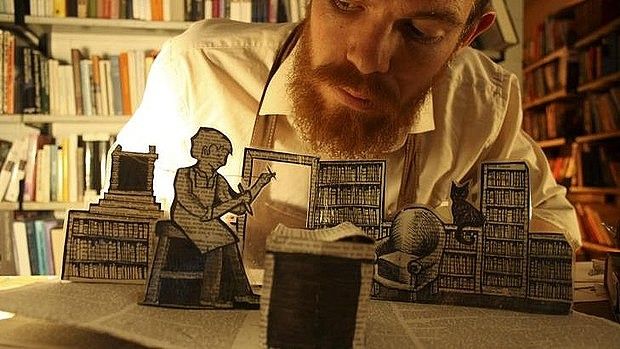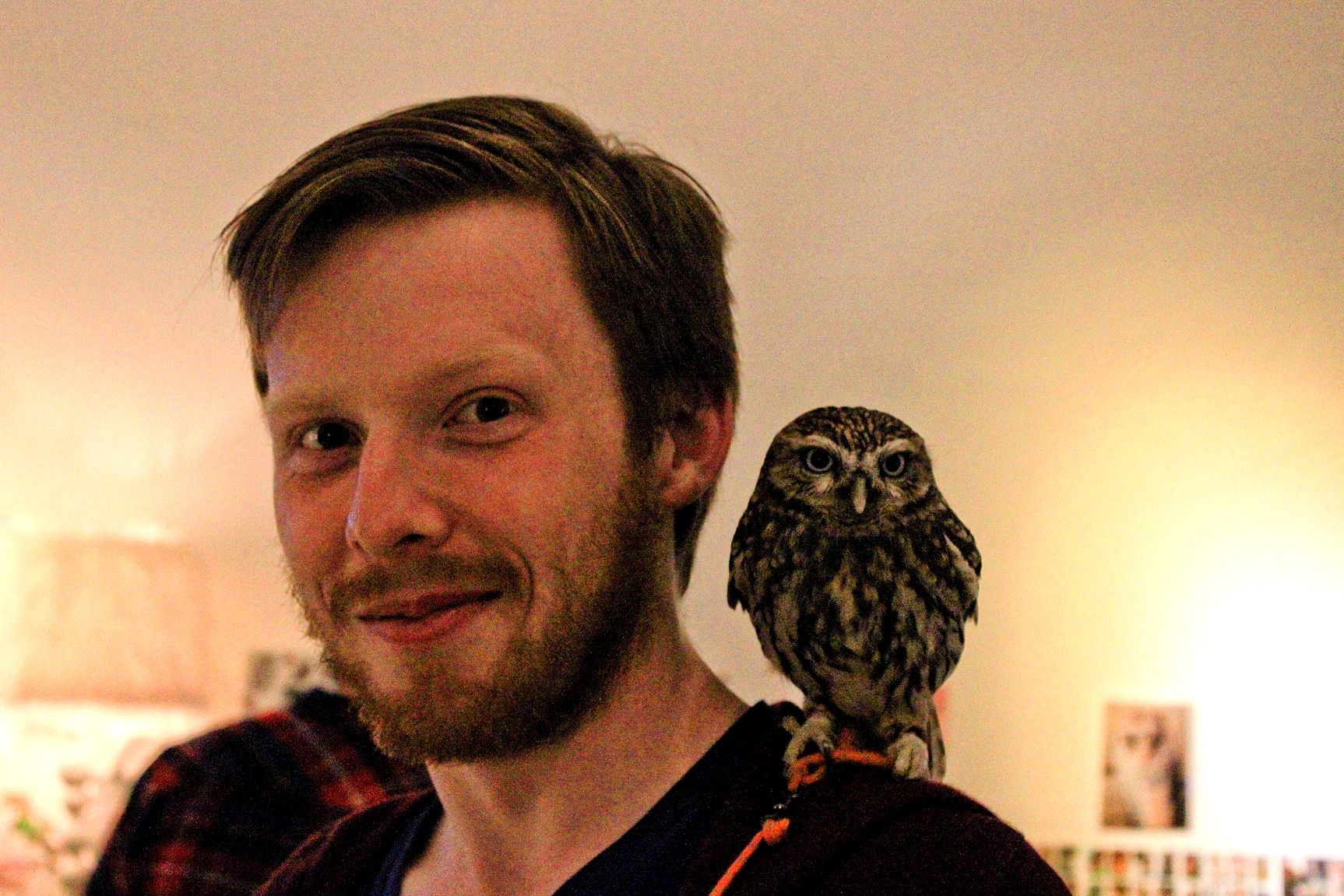Review: The Bookbinder
Adam Goodall reviews Trick of the Light's The Bookbinder.
It’s as if Ralph McCubbin-Howell really enjoys knowing what we don’t. When The Bookbinder approaches one of its many blind corners, he slows his delivery right down. He drops his voice low. He makes comments dripping with menace hinting at what our young hero might find around the bend, Vincent Price telling you a bedtime story. And there’s a gleam in his eye, and a smirk: not mean but knowing, knowing the floor’s about to fall out from under the boy. Knowing the floor’s about to fall out from under us.
He’s having way too much fun to be healthy.
Trick of the Light Theatre’s The Bookbinder is a solo show that takes place in and around a desk, but it’s also a sprawling dark fairy tale in the vein of Neil Gaiman and The Neverending Story. McCubbin-Howell is a nameless bookbinder, startled out of his sleep by a skipping record and telling us, unprompted, a story about a boy who leaves his home in search of excitement. The boy ends up an apprentice to a (different) bookbinder, an eccentric who keeps a cramped store in a town an awful lot like Oamaru (like The Road That Wasn’t There, Trick of the Light’s first family show, The Bookbinder builds its fantasy on the South Island's vast landscapes and rustic personality). Arrogant and pining for thrills, the boy brashly tells an old woman he'll rebind her mysterious book within the day. But deadlines loom and the boy takes a shortcut...opening a Pandora’s Box in the process.
The Bookbinder calls back to those books that find their way into your hands when you’re 6 or 7 or 8 years old and learning that stories can have grim and scary shit in them and still be enjoyable. Trying to cover up his mistakes, the boy is sucked into the world inside the book: a world that’s dark and cold, where everything stretches out into oblivion. McCubbin-Howell’s script builds a richly-detailed wasteland out of finely-tuned phrases and callbacks. His initial description of the book, “blackened beneath a grime of smoke and open fire”, defines the world’s colour palette; meanwhile, a chilling nursery rhyme about a bookbinder’s tools defines the world’s unforgiving life. Director Hannah Smith and composer Tane Upjohn-Beatson fill the wasteland in: Smith’s exquisite pop-up books illustrate the story with charcoal colours and Gorey-esque designs, and Upjohn-Beatson’s eerie score opens it up to the room, plucked strings and minor chords carried on hostile winds.
Not that this is all Swamps of Sadness. When I say McCubbin-Howell’s having way too much fun to be healthy, I mean it. His energy’s infectious and he shifts between breathless adventure, ominous foreshadowing and moments of deep desperation while deftly avoiding emotional whiplash. He also relishes in the moments that poke fun at the language and conventions of a story like this. These pockets of genre-savviness are played fast and arch, like a bemused but sympathetic observer; they’re always funny, frequent enough to lighten the emotional load, and sparse enough to avoid becoming smug. Like most modern fairy tales of any worth, The Bookbinder is a balancing act between the old-fashioned and the modern, fully committed to its traditional frame while conscious of its place in that tradition.
That’s part of why The Bookbinder feels so comfortable and familiar, even when it’s commenting on itself. The packaging helps, too. It always helps. Hannah Smith’s stage looks like the back room of a neglected Victorian-era heritage building, a space out of time (again, its roots in South Island identity run deep). Bookshelves line the walls, faded leather spines crammed into the slots, and the action all takes place around a battered wooden writing desk. Everything looks musty, even Ralph, and anything that wouldn’t is altered by the strong yellow of the bulbs that light the space, one at a time, through shaded lamps. There’s so much care in the design that the space feels well-worn, generations old.
This is well-worn territory for Trick of the Light, though, in a way. Since The Engine Room in 2011, Smith and McCubbin-Howell have been telling stories about people dragged into the inverse of their personal bubbles, forced to confront their responsibility to the world around them and reconcile their behaviour with that responsibility. The show shares substantial DNA with The Road That Wasn’t There, their 2012 show about a girl who travels down a road that’s not on her map and discovers a heady town of puppets, papercraft and shadowplay; there are also threads of The Engine Room and Broken River and McCubbin-Howell’s 2014 Young & Hungry contribution, Second Afterlife. Trick of the Light tells this kind of story well, and there are times in The Bookbinder when Smith and McCubbin-Howell create their illustrations in visceral, beautiful ways (a scene late in the game comes to mind, when the boy comes face to face in the wasteland with someone close to him). But there are other times where the story is too thinly-sketched, too fast to land; moments that skip along too light to generate the excitement and gravity that would really push this show to the front of their pack.
All that said, the craft here is immense. The Bookbinder is that kind of wonderful capsule that transports you back ten, twenty, forty years ago to when you cracked open that first fantasy book with a little bit of darkness in it. It provokes old sensations, draws them out of the woodwork of your mind and brings them flooding back: the good humour, the rollicking adventure, the terror, the delight at the terror. It’s too much fun to be healthy, really.
The Bookbinder runs at
Circa Theatre from September 25 - October 10
For tickets and more information, go here.

